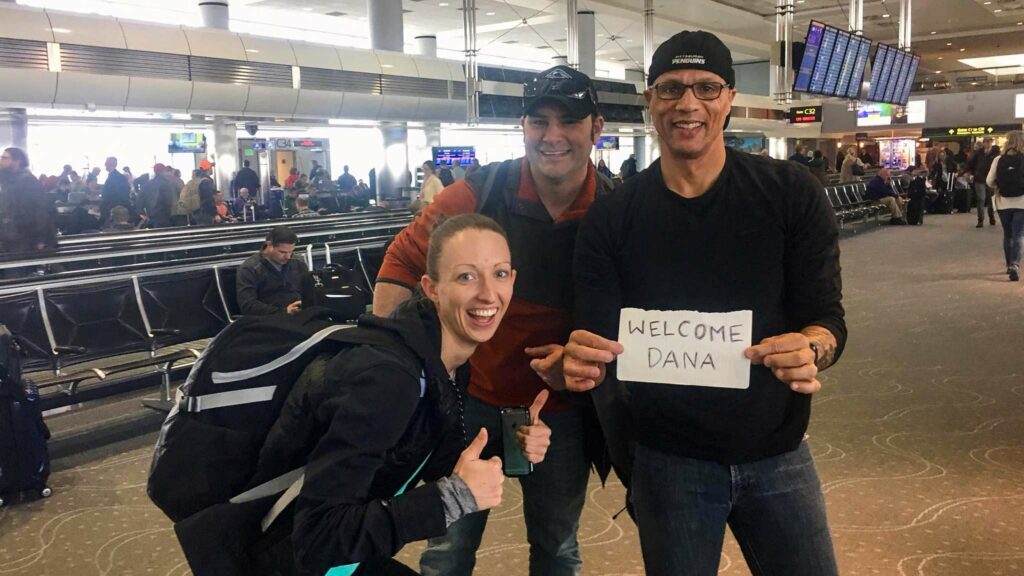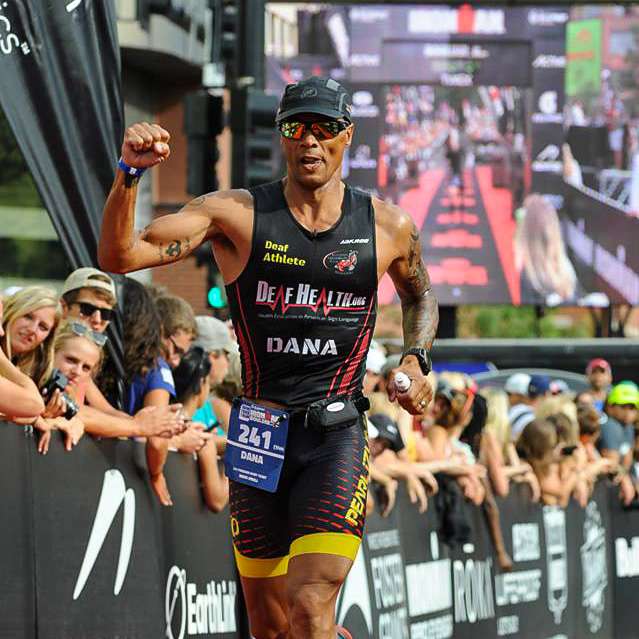Honestly, I can’t even count how many times someone has commented to me that they think it’s really cool that I can be deaf and race in triathlons. For some reason, many people assume that deafness is such a limiting thing. Well, it’s not.
I wasn’t born deaf; I became deaf at the age of 23 due to something called Menier’s Disease. I was already a father. I was already a teacher and track/cross country coach. Speaking and hearing was the only way I knew how to live my life. I was also a musician. I started playing the piano when I was five. That morphed into the violin, flute guitar, bass guitar, and voice. Being that involved with music, people asked me how I handled losing my hearing in the span of a year. The best analogy I had was that it was like a Heisman Trophy-winning quarterback losing his arm in an accident. Everything in my life changed. I wanted to keep my teaching and coaching jobs. I knew I had to continue to use my voice, but I also immersed myself in American Sign Language (ASL). Signing became my preferred way of communication.
The why I’m deaf isn’t the point. The point is what I’ve chosen to do despite being deaf.


People ask me, “Isn’t it hard to race an Ironman and be deaf?” I like to respond by telling them that doing an Ironman is also hard if you’re hearing. Some people get concerned that I may not be able to train or race safely if I’m deaf. It is true that I cannot hear cars or bikes approaching from behind. Is it a safety risk for my fellow competitors and me? Often, what hearing people don’t know is that deaf people are more visually aware. I don’t necessarily see better–especially at age 52–but I notice more and am more cognizant of my surroundings. Researchers are still trying to understand why deaf people process input differently.
I believe all athletes struggle a bit when they enter the sport of triathlon. Most of us come from a background in one of the three disciplines. My experience was Track & Field where I was a decathlete. So, biking wasn’t too difficult for me to pick up, but swimming was another story. Often cyclists and swimmers hate running. We all must learn to adapt to the discipline(s) that put us outside of our comfort zone. For me, that was swimming. I’ve always known how to swim but trying to become a competitive swimmer who is deaf was a whole new sensation. Being a deaf cyclist was an entirely different experience as well. I had to learn that needed to forcing myself, at first, to pay attention to anything and everything. Over time I was able to adapt to the water and being on the bike to perform with confidence. It’s true that being a deaf triathlete is a unique experience. Here is a taste of what the disciplines feel like while I’m competing.


SWIM
As I swim, I notice things others might not with the feel of water rushing over my torso and legs. I notice the difference as my body slides through clean water as opposed to the slight tickle through bubbles of someone’s draft. I notice the resistance the water offers and how it makes my fingers wiggle as I pull through. Rarely, do I not swim straight because I see things visually too. I don’t necessarily sight for buoys more often, but it’s almost like a photographic/kinesthetic image gets mapped in my brain and body. I can feel if I start to go off course based on the image in my brain. My field of vision, I think, is a bit wider than most. Again, this allows me to keep things pretty straight, so I don’t go off course.
BIKE
Much like the water, I am keenly aware what the air feels like as I ride. I notice shifts in the wind, like most. I notice shadows. I actually feel even the slightest crack in the asphalt. The smallest changes, out of the corner of my eye, do not go undetected. I actually stopped wearing a long-tailed aero helmet because I move my head around often. As I ride, I find that the more aggressively I ride, the more I can avoid any difficulty. If I’m on the attack, I don’t have to ride as defensively and feel as though I have more “control.” There was one situation at an aid station in Kona where another rider almost took me out. I feel that because of my awareness I was able to avoid a catastrophe for myself and other riders. If you’re off the front, there are fewer obstacles to slow you down too.
RUN
Running really isn’t so different than anyone else out on the course. I suffer just like any hearing person. I do like running over footbridges so I can feel the vibrations. Though hearing people can feed off the energy of the crowd as they make their way through the course. People shout their names to make it more intimate. Depending on the area of the race, I try to give lots of high fives–especially coming down the chute–and a thumbs up. I want people to know that I appreciate their presence, even if it’s not for me. Showing appreciation for them gives me a lift. I’m thanking them for being there and it, in turn, gives me a boost.

I do this sport for the same reasons hearing people do this. The fact that I am deaf does not limit me or my dreams. If, along the way, someone thinks, hey, that’s kinda cool, well, thanks. But please don’t see it as something special or unique. My body works just fine, it’s just my ears that don’t. I do this for the love of challenging myself, fitness, sport, and competition. JUST LIKE YOU!
#endureandenjoy365






Comments